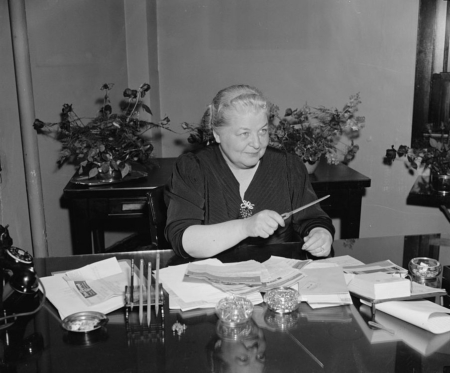
Florence Kerr was an assistant administrator in the Federal Emergency Relief Administration (FERA) and the Works Progress Administration (WPA) from 1935 to 1938, and then became head of the WPA’s Women’s and Professional Projects Division from 1938 to 1943. The division’s former chief, Ellen Woodward, had left to become a Social Security Board member.
Florence was born on June 30, 1890 in Harriman, Tennessee to Thomas James and Ruby May Stewart [1]. Early in her life, the family moved to Marshalltown, Iowa, and Florence grew up as a “Marshalltown girl” [2]. She graduated from Grinnell College in 1912 (the same college and graduating class as her future boss, Harry Hopkins) and married Robert Y. Kerr in 1915 [3]. The couple had one child, F. Elizabeth Kerr, who unfortunately suffered from serious disability and illness and died in 1938, at just 11 or 12 years old [4].
After graduating from college, Kerr held various education positions, including teaching at Marshalltown High School and Grinnell College. During World War I she was a supervisor for the American Red Cross [5]. In 1935, Kerr was working for an unemployment relief office in Iowa when WPA Administrator Harry Hopkins asked her to come to Washington, DC for a talk. As a result of that meeting, she became FERA’s Midwest Director of Women’s Activities, supervising thirteen states. When the FERA program ended shortly after her arrival, she moved into the same job for its successor program, the WPA, from 1935 to 1938 [6].
When Kerr took over the WPA’s Women’s and Professional Projects Division in late 1938 she had oversight of more than 400,000 workers in a wide array of jobs, including “arts, music and writing; education, recreation, research, and library; tax delinquency surveys, engineering surveys and codification of laws; school lunches for needy children, nursing and other public health work; the providing of housekeeping aides for needy families and the training of household workers; historical records, and archaeological surveys; sewing and other important programs” [7].
In 1963, Kerr reflected on her time in the WPA: “I felt that I was completely caught up in it. I had no – I was so engrossed in what I was doing – just swimming for the shore, never knowing if I’d get there… But there was never any lack of interest, nor any lack of belief in the importance of what I was doing. I was thoroughly convinced that I had to get it done, had to get it done the best way I possibly could… There were just hundreds of us that were completely sold on the idea of work vs. the dole. We believed in it, and if we possibly could we wanted to make a success of it” [8].
Kerr was a strong advocate of the WPA, and as the war began to impact its programs she defended the nursery and daycare centers before Congress “as vital for mothers engaged in defense work.” Many women’s projects continued until final liquidation of the WPA in 1943 [9].
Shortly before the WPA’s termination, Kerr became director of the War Public Services Division of the Federal Works Agency (FWA). There, she supervised public works projects (for example, sanitation improvement, schools, and childcare) for communities overwhelmed by defense plant and defense worker expansion. She held this position until the end of 1944 [10].
After her time with the New Deal, Florence Kerr worked as an executive for Northwest Airlines and served as the first vice president of the Woman’s National Democratic Club [11]. She died on July 6, 1975, and rests at Hazelwood Cemetery in Grinnell, Iowa [12].
Sources
(1) “Miss Stewart to Wed,” Evening Times-Republican (Marshalltown, Iowa), May 7, 1915, p. 8; and “Florence Genevieve Stewart Kerr,” Find A Grave (accessed October 12, 2020). (2) See note 1, Evening Times-Republican.(3) Ibid. (4)“F. Elizabeth Kerr,” Find A Grave (accessed October 12, 2020), and “Oral history interview with Florence Kerr, 1963 Oct. 18-Oct. 31,” Smithsonian Archives of American Art (accessed October 12, 2020). (5) See, e.g., Susan Ware, Beyond Suffrage: Women in the New Deal, Cambridge, Massachusetts: Harvard University Press, 1981, p. 188. (6) See note 4, oral history interview. (7) “Mrs. F.S. Kerr to Speak in Nashville,” The Bristol Herald Courier (Bristol, Tennessee), May 11, 1941, p. 2. (8) See note 4, oral history interview. (9) “Kerr, Florence,” Encyclopedia.com (accessed October 12, 2020). (10) See, e.g., “FWA Official Resigns Post,” The Times Dispatch (Richmond, Virginia), December 28, 1944, and Fourth Annual Report, Federal Works Agency, 1944, pp. 9-12 (11) See note 9, and “400 Demo Women Hear Party Leader,” The Bristol Herald Courier (Bristol, Tennessee), October 24, 1954, p. 1. (12) See note 1, Find A Grave, and “Mrs. Kerr, FDR aide, dead at 85,” The Courier (Waterloo, Iowa), July 13, 1975, p. 12.
« Back to Glossary Index